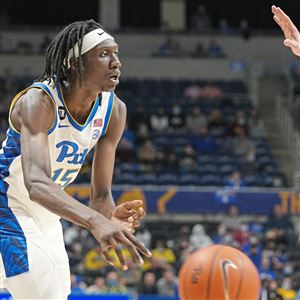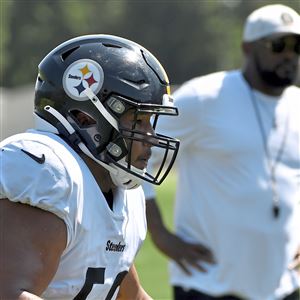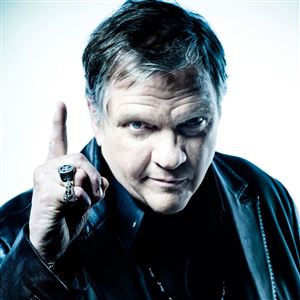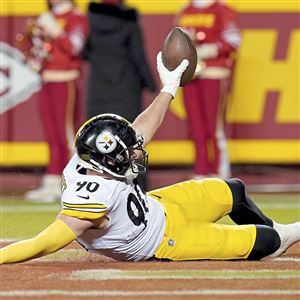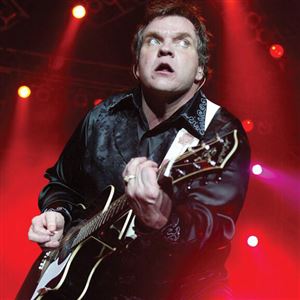He’s doing it for love, not money.
Meat Loaf — who has sold more than 65 million albums worldwide, starred on Broadway, and appeared in more than 50 movies and television shows — will sit behind the table at Steel City Con this weekend in Monroeville in spite of his social anxiety issues, not because he’s broke but because he loves connecting with fans.
The 73-year-old singer, born Marvin Lee Aday in Dallas, arrives having not played a show in five years due to multiple back surgeries and his lapse in physical therapy during the pandemic.
In April, he lost beloved collaborator Jim Steinman, with whom he created “Bat Out of Hell,” one of the best-selling albums of all time. The 1977 debut, released after his stint on Broadway and his appearance as Eddie in “The Rocky Horror Picture Show,” made the overweight rocker an unlikely star with the hits “You Took the Words Right Out of My Mouth, “Two Out of Three Ain't Bad” and the unhinged “Paradise by the Dashboard Light.”
Its sequel, “Bat Out of Hell II: Back into Hell,” coming five albums and 16 years later, produced his first chart-topper: the playfully confounding “I’d Do Anything for Love (But I Won't Do That),” which went to No. 1 in 28 countries.
The last we heard from him musically was the 2016 album “Braver Than We Are,” which found him reuniting with both Steinman and Ellen Foley, his partner in crime on “Paradise.”
This weekend, he shares the bill at Steel City Con with Tom Arnold; Kevin Dillon; Breckin Meyer; Robert Englund; “The Walking Dead” stars Emily Kinney, Steven Ogg and Caley Fleming; Carl Weathers; and more.
Last week, he spoke to us from his home in Nashville, Tenn.
What has your situation been like during the pandemic?
Before then, I’d gone over to the U.K. and shot a commercial, came back, was doing PT, was doing really well. I had eight shows booked in the U.K., and I felt really strong about being able to do them. COVID hit. I lost my PT, and all this all the strength in my back muscles just left, and I was worse off than before.
Because you couldn't do physical therapy?
No, and I tried to do it. I have a treadmill and a recumbent bike and some free weights. And my stress regime was in there from the road, and I was on that stress machine all the time. I mean, when I'm on the road, I know it seems weird for people to understand this because, “Oh, he’s overweight, it’s bad, blah blah blah,” but I could do 40 minutes of that machine where you go up and down and 40 minutes on the recumbent bike. Going through all these, I was in the gym for 2½ hours on days off, and these guys would walk in, they were fit-looking, I could beat them on any machine they wanted, but that wasn’t the goal. The goal was just to stay fit and be able to do my show. And that's what I did, cause my show was very ... almost athletic. And I never backed down. I mean, I didn't do a song and then take the time to talk for 3 minutes in between, telling you about how, ‘Well, I wrote this when a truck ran over my cat, and I felt horrible about it.’ Most bands, they'll do a song and then say something, do a song and then say something. We hit the stage, and for two hours, I never said a word, except in character on “Took the Words...”
Are you hoping to get back to doing shows at some point?
Well, that's what I wanted to do. But right now, it's questionable. COVID put me back to zero. My whole life was spent in football and then in shows and gyms, and when you’ve done something and then stop it, you deteriorate that much faster.
Phil Collins did his last tour in a chair.
Yeah. Well, that's what I was hoping to do. I don't know if that's going to happen.
Do you do a lot of these comic con-type events?
I do some. I never do anything for the money. I do it so I can continue to communicate with fans and the people that support me. It's important to communicate with them. I did cameos for the same reason — not for the money, for the opportunity to talk to them. Cameos, you only get one way. At comic con, it's like double action. They talk, I talk. They talk, I talk. Mostly I talk after they talk.
What do people tend to want to know from you?
Anything you can think of: “Bat,” “Bat II,” “Anything for Love,” “Paradise,” “Crying Out Loud,” “Fight Club.” I mean, you know, I've done 70 films, I believe. You’d be surprised. “Roadie” was released in 1979, and I had at least 10-15 people last week talk to me about it.
I was reading your Wiki page today, you've probably seen it, and it says ...
I hadn't seen it for a long time, and I looked at it the other day, and I've never read such a pack of lies in my life. Somebody rewrote it, and I don't know where they were from, but I think they were from Australia.
What jumped out at you that wasn't true? Was it something serious?
Yeah, very serious, but I'm not going to talk about it with you ’cause I don't want to put any more ...
There was something in there about you having social anxiety around meeting people. I was thinking about you doing these cons.
Yeah, yeah. I’m very shy. I don't go out a lot. I don't want to go out a lot. Going out and interacting scares me.
So, isn’t this a really difficult thing to do?
No, because I’m behind a table. I know they're coming, and they talk to me — and that's great. And there's basically a window. I have called out people at comic cons, other entertainers, for not even looking at the people. Everybody is due the same respect that you want for yourself. No one is more important than anybody else. I'm not any more important than any one of those people that come to that table.
Well, that's not really how people see that. Celebrity is very important in this country and all over the world.
I know. I don't care how they see it. The truth is, that's exactly how it is. That's the real truth.
I have a son in his 20s, and last year when we got together, he had “Paradise by the Dashboard Light” on his playlist.
Can I explain to you? Last September, October, I was trending No. 2 on TikTok, and in 2018, “Paradise by the Dashboard Light” went gold. In 2019, it went platinum, and I believe in 2020, it went double platinum. So, I'm relevant!
When you were making that “Bat Out of Hell” record, did you have that notion that you were making something that would endure 40 years?
No. Jim and I were hoping we'd sell 100,000 copies so we could do another one, because back then, if you could sell 100,000 copies, 150,000 copies, the record company would invest for you to do another album. That's what we were hoping. That's what we were predicting. That's all.
We knew how much everybody hated it. People at the record company hated it. Radio stations hated it. We had a few allies, but not many. No Top 40 allies at all, until one of the stations. … There were 25 big reporting stations in America in 1978, and one of them was in Buffalo, and there was a lyric, “You'll never find your gold on a sandy beach,” in “Two Out of Three Ain’t Bad.” The program director in Buffalo, his name was Sandy Beach, so we got lucky.
And we had a great guy working for us by the name of John Sykes, who was a college rep and really helped break “Two Out of Three Ain't Bad.” Then he became a regular rep for CBS and he was stationed in Chicago, and “Paradise by the Dashboard Light” became the No. 1 single in Chicago. It came on the charts in October at No. 36. Casey Kasem, who had been a real advocate for us with “Two Out of Three Ain’t Bad,” suddenly became a real enemy, and he wrote a letter that went out and said “Get this trash out of the Top 40,” because it was too sexually overt.
And now, we've got some artist, I won’t call her out by name, but she is really pornographic. And the president of this country did an interview with her, and she's being honored by everyone, and I'm sorry, there is a limit to what a listener should have to deal with. Music is about fantasy. Sometimes it’s about real life, but it’s not about your life, it's about their life, and you can relate to it on that level. I'm not going to call her by name. She doesn't deserve it.
So, what did these people have against you back then?
They didn’t like the record. But it became more than that. I was driven to make that record work. That was the only thing in my life that made any sense to me. And I worked, I would do five to six shows a week. The weekends in the cities we were in that had “Rocky Horror,” I would go to the showings at midnight. I would go to morning radio, show up at 7 a.m. I would work morning radio, go back, take a nap, do an interview before soundcheck, get ready to do the show and then I’d do more press after.
I was bound and determined, and it worked to the point where the public became very much aware of me and aware of this record. And I knew from this fact: Jim and I had played small little supper clubs — 60 people, 80 people, 100 people — in New York, and in a supper club, the audience is very polite: “Oh, that was good, that was very good.” That's not what happened when we played. They were standing up, screaming. And Jim knew it. Jim’s smarter than me. He knew that with him and me, we had real power. I’d never been told I could sing that good. Jim was never told, “What a great writer you are.” But together, that’s what it was.
It was a slightly unusual sound. It was different.
It was very theatrical. Jim’s songs were long, but I'm responsible for making them longer. Jim brought me “Bat Out of Hell,” and it ended on the second chorus. He said, “What do you think?” I said, “Jim, the song is astounding, but where's the rest of it?” He goes, “What do you mean?” I go, “Well, what happened to the guy? You're going to tell a story, you gotta finish it. It’s like a bad ending to a movie.” He goes, “OK,” and he finished it and brought it back in, and I said, “OK, let's go do this!”
We recently lost Jim. I wanted to offer my condolences.
I don't know what you're going to say, but I can't really talk about it, because if I do, I can no longer talk.
It must be very difficult.
It’s extremely difficult. And not knowing what happened to him after he died is even more difficult. There was no funeral. We don't know where he is. We don't know what happened to him, because the guy who took care of it is very selfish.
I’m sorry. Maybe we can talk about a positive thing, like, what was your last great experience with him?
Jim had three open-heart surgeries, and that's the reason he didn't produce “Bat Out of Hell III,” and that's the only reason. Any time you've ever read, “Oh, Meat Loaf and Jim Steinman are fighting,” “He’s suing and blah, blah, blah, blah” — what a bunch of bull. The only time I ever got mad at Jim, really mad, was we had “It’s All Coming Back to Me Now” for “Bat Out of Hell II,” and I said, “Oh it's a duet.” Jim goes, “We already got a duet,” and he says, ‘We’ll save it for ‘Bat III.’ ”
Then Celine Dion got her hands on it. Jimmy didn't give it to her, our publishing company did. But I got mad at him for not, you know, putting it in chains, but that's OK, I got to do it anyway with a great singer from Norway [Marion Raven], and it was Top 10 all over the world pretty much, except the United States. All right, you’ve got one more question, and then I’m running.
What do you have in terms of songs you haven’t recorded?
I have a new song Jimmy wrote for me, and it got put in the musical “Bat Out of Hell,” which was fine. Jimmy didn't do it. The producers had a contract with them that they could hear songs that he's written. And that was contractual, and they said, “It’s going in the show,” and that's fine, because I'm going to do it now. They did it. It's night and day.
Do you remember ever being at The Decade in Pittsburgh? With the Iron City Houserockers?
I could have been. I went one night to the Iron City Houserockers, and I got up on stage with them and Mick Ronson got up. There's pictures of that night. They were very nice guys. They had a very good record.
Thank you so much for your time, and all the best to you.
All the best to you, and you have fun, and if you want to come to the con, come by and say hello. I’m happy to give you a hug. I hug people in the middle of COVID.
You do? You're not afraid?
Oh, I’m scared to death! You kidding me? But I'm sorry, I understood stopping life for a little while, but they cannot continue to stop life because of politics. And right now they're stopping because of politics. And on CNN last night, it finally came out that the masks we’re all wearing are useless. But I've known that for six months. They don't do anything. They don't stop you from getting COVID. They're just a nuisance and make your nose itch and make it so you can't breathe.
The only good masks are N95. But we got one, and it was so badly made, the straps were so short, they would go on a child. So we had to go on the airplane with the paper masks and then on the way back, we got a Nazi: “Get your mask on now!” They’re power-mad now.
Oh, God. We're being controlled by everybody.
Yeah, I know. But not me. If I die, I die, but I'm not going to be controlled.
Steel City Con is at the Monroeville Convention Center at 10 a.m.-8 p.m. Friday ($23) and Saturday ($35); and 10 a.m.-5 p.m. Sunday ($23); $50 three-day pass; steelcitycon.com.
Scott Mervis: smervis@post-gazette.com.
First Published August 9, 2021, 3:08pm


